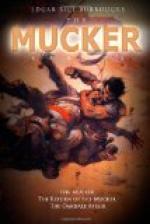Swiftly she ran to Byrne, shaking him roughly by the shoulder.
“Someone is coming,” she cried, in response to his sleepy query.
CHAPTER XIV
THE MUCKER SEES A NEW LIGHT
Together the girl and the mucker approached the entrance to the amphitheater. From behind a shoulder of rock they peered down into the forest below them. For several minutes neither saw any cause for alarm.
“I guess youse must o’ been seein’ things,” said Byrne, drily.
“Yes,” said the girl, “and I see them again. Look! Quick! Down there—to the right.”
Byrne looked in the direction she indicated.
“Chinks,” he commented. “Gee! Look at ’em comin’. Dere must be a hundred of ’em.”
He turned a rueful glance back into the amphitheater.
“I dunno as dis place looks as good to me as it did,” he remarked. “Dose yaps wid de toad stabbers could hike up on top o’ dese cliffs an’ make it a case o’ ’thence by carriages to Calvary’ for ours in about two shakes.”
“Yes,” said the girl, “I’m afraid it’s a regular cul-de-sac.”
“I dunno nothin’ about dat,” replied the mucker; “but I do know dat if we wants to get out o’ here we gotta get a hump on ourselves good an’ lively. Come ahead,” and with his words he ran quickly through the entrance, and turning squarely toward the right skirted the perpendicular cliffs that extended as far as they could see to be lost to view in the forest that ran up to meet them from below.
The trees and underbrush hid them from the head-hunters. There had been danger of detection but for the brief instant that they passed through the entrance of the hollow, but at the time they had chosen the enemy had been hidden in a clump of thick brush far down the slope.
For hours the two fugitives continued their flight, passing over the crest of a ridge and downward toward another valley, until by a small brook they paused to rest, hopeful that they had entirely eluded their pursuers.
Again Byrne fished, and again they sat together at a one-course meal. As they ate the man found himself looking at the girl more and more often. For several days the wonder of her beauty had been growing upon him, until now he found it difficult to take his eyes from her. Thrice she surprised him in the act of staring intently at her, and each time he had dropped his eyes guiltily. At length the girl became nervous, and then terribly frightened—was it coming so soon?
The man had talked but little during this meal, and for the life of her Barbara Harding could not think of any topic with which to distract his attention from his thoughts.
“Hadn’t we better be moving on?” she asked at last.
Byrne gave a little start as though surprised in some questionable act.
“I suppose so,” he said; “this ain’t no place to spend the night—it’s too open. We gotta find a sort o’ hiding place if we can, dat a fellow kin barricade wit something.”




